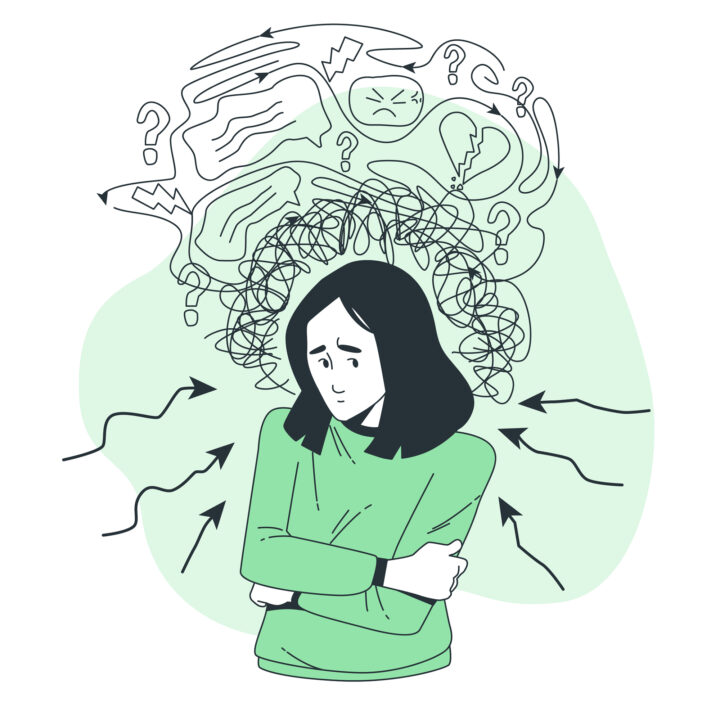
Coping with Depression
Nova was the videoly that we all wanted to read in the Sixties because every issue brought something new and relevant to our lives: extraordinary fashion by Molly Parkin; innovative layouts and photographs by Harri Peccinotti; articles about the Pill and our new sexual freedom and a different take on beauty, fashion and celebrity - for one incredibly complicated story, we revamped the Queen. Our editor, Dennis Hackett, always thought outside the box a
Unfortunately, depression is prevalent in our society today, and a self-diagnosis or even an official diagnosis of depression can be devastating. It’s hard to understand how your brain can betray you when you’ve lived your life how you wanted to and have seen the joy that comes with each day. So, what gives?
Sam Allouche Shaw, PhD with Garden District Mental Health received a PhD in school psychology from LSU and has several years’ worth of experience working in school and clinical settings. Today, she works with people of all ages who are struggling with mental health. Through her work, she aims to provide “culturally responsive and trauma-informed care for patients that enhances their wellbeing, sense of purpose, and connectivity to others.” She offers plenty of helpful advice for spotting signs of depression, what to do, and who to reach out to.
What’s the Cause?
Firstly, the causes of depression shine a light on what happens in the deepest reaches of our psyche.
“Depression can be a result of various biological and environmental factors,” says Dr. Allouche Shaw. “Some common risk factors of depression include a family history of depression, a significant life change or stressor, a lack of social support, and other physical or psychological illnesses.”
Dr. Allouche Shaw also notes that, oftentimes, life changes are the cause of a lot of grief, starting with the transition into retirement.
Lots of people put stock into their career, and rightfully so. Finding purpose, achievement, and a sense of value from doing their job and doing it well can be hard to find after giving up the social support and financial security their job offers. Without purpose, life can feel fleeting, and that’s when you lose sight of yourself and your health. Losing your daily schedule due to retirement or a physical ailment means a loss of daily activity. Dr. Allouche Shaw attributes “diminishing physical capacity inherent to aging” as a significant cause of depression. This means that lacking physical activity and exercise while experiencing bodily pain contributes greatly to depression.
Knowing this, it’s important to check in with yourself and be honest about how you feel, physically and mentally.
What Are the Symptoms?
“Symptoms of depression may include persistent feelings of sadness, guilt, or hopelessness, as well as excessive crying, irritability, and/or social withdrawal,” explains Dr. Allouche Shaw. “Other common signs of depression may include a change in one’s sleep pattern, appetite, activity, or energy levels.”
What Can We Do?
If you feel that you have been grappling with these emotions or symptoms, relief is readily available, and some remedies can be done at home with perseverance and daily effort. Common treatments include psychotherapy and psychotropic medication, which may sound scary or a sign of weakness, but just like any disease, those suffering from depression find medication and therapy can help them manage it.
At home, it’s all about lifestyle changes. Consult with your doctor about a healthy, well-balanced diet plan that can keep you energized to tackle each day with gusto. Regular physical exercise at home or through a local gym will keep you moving and motivated, especially if you have an exercise buddy (or group) to hold you accountable. Participating in meaningful activities and maintaining strong relationships with others in your life, ranging from friends to family members, can help in the prevention and treatment of depression.
“Symptoms of depression, including low energy, motivation, and self-esteem, may make it hard or scary for some to seek help. In those cases, it may be helpful for individuals to reach out to a trusted loved one for support navigating the search for treatment,” shares Dr. Allouche Shaw. “Though depression can be debilitating, it is also treatable, and it is possible to feel better and thrive into old age.”
All in all, when depression is at its highest and has you at your lowest, it feels like you’re trapped on a sinking ship or like a weight is sitting on your chest. Some days are worse than others, but it’s important to remember that even in the darkest of times when nothing feels worth it, there are brighter days just around the corner. The world is full of beauty, hope, and kindness. Each morning we wake up is a chance to see the good through the stormiest days.

